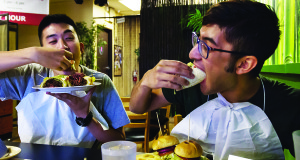Standing on the rooftop, George Chen looked almost regal.
It was a sunny day in San Francisco, the city’s vast expanse of hills and colorful houses free of fog.
With his hands on his hips, Chen moved his hulking frame towards the edge and looked down at the Chinatown alleyway that would become the private entrance to his forthcoming high-end Chinese restaurant, 8 Tables by George Chen – one part of his plan for a four-story culinary and retail complex called China Live
“You ever meet a Chinese person who doesn’t like to eat?” he chuckled. “There’s not many.”
Chen is one of the 25 local chefs whose recipes are featured in the AAJA San Francisco Bay Area chapter’s East West Eats cookbooks, which compiles recipes from big culinary names in the city with hunger-inducing photos by award-winning AAJA photographers.
The project, conceived several years ago and now in the final stages of production, began as an offshoot of the chapter’s annual East West Eats culinary showcase, where many of the same chefs demonstrated their prowess in the kitchen to captivated crowds. Both cookbook and showcase aim to raise funds for an AAJA student scholarship.
“It was like having a wedding every year,” Ryan Kim, a former chapter president who initiated the venture, said of the event. The idea of the cookbook was to take away the burden of planning such a large affair while still upholding hometown eating traditions.
The book, which features everything from snow pea shoot dumplings to croissant bread pudding, is slated for official publication this fall. It is available for pre-sale orders on Indiegogo and at Hyatt Regency during the AAJA national convention.
In addition to Chen, the cookbook’s roster includes other major players in the San Francisco food scene like Belinda Leong of B. Patisserie and Charles Phan of Slanted Door, in the Ferry Building near the convention.
As Bay Area chapter member Patti Tom notes in the publication’s “Letter from the Editor,” the unconventional path that renowned Vietnamese chef Phan took to reach his level of success is inspiring to young Asian American journalists facing a comparably uncertain future.
“The intersection of Asian cuisine and AAJA makes sense as a way to support and give coverage to under-recognized communities,” Tom writes, “and to encourage the Bay Area’s youth to pursue their career dreams.”
Phan exemplifies that spirit, as Tom points out. He “wasn’t always known as the inventor of modern Vietnamese cuisine in the United States.”
Prior to his foray into the restaurant business, he studied architecture at UC Berkeley, designed clothing and even sold software. Through these varied experiences, he realized that what he enjoyed most of all was supporting his family through the kitchen.
Today, the Slanted Door is one of the highest-grossing independent restaurants in California, according to Restaurant Business magazine.
No less ambitious than Phan, Chen is on a mission to prove to consumers that Chinese food doesn’t have to be cheap — and that soy sauce can be as diverse as olive oil.
“Most Americans think it’s just red cap, green cap,” he said. Chen’s recipes in East West Eats include mapo tofu and “Mom’s Favorite Pot Stickers,” which he made in his home kitchen using a cast iron pan.
Ever the stickler for authenticity, Chen said, “If they don’t actually stick to the pan, you’re cheating.”
 VOICES Publishing from the AAJA National Convention
VOICES Publishing from the AAJA National Convention







